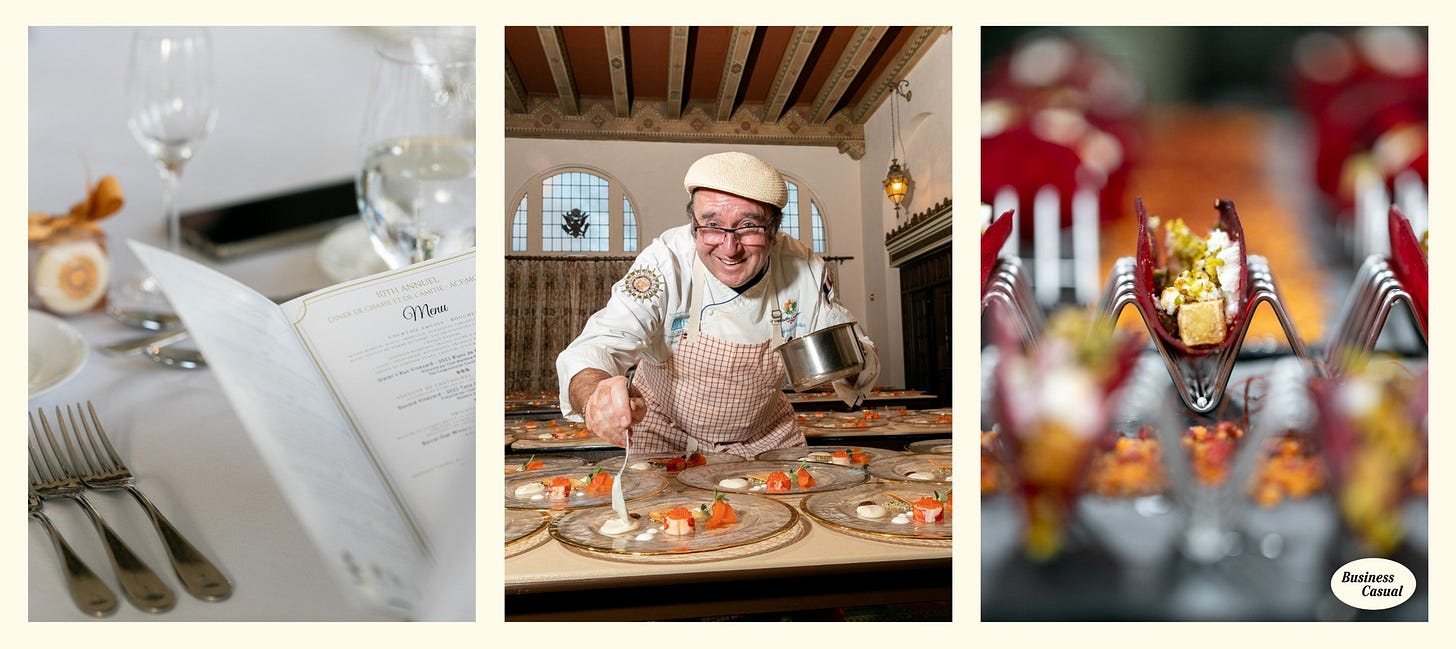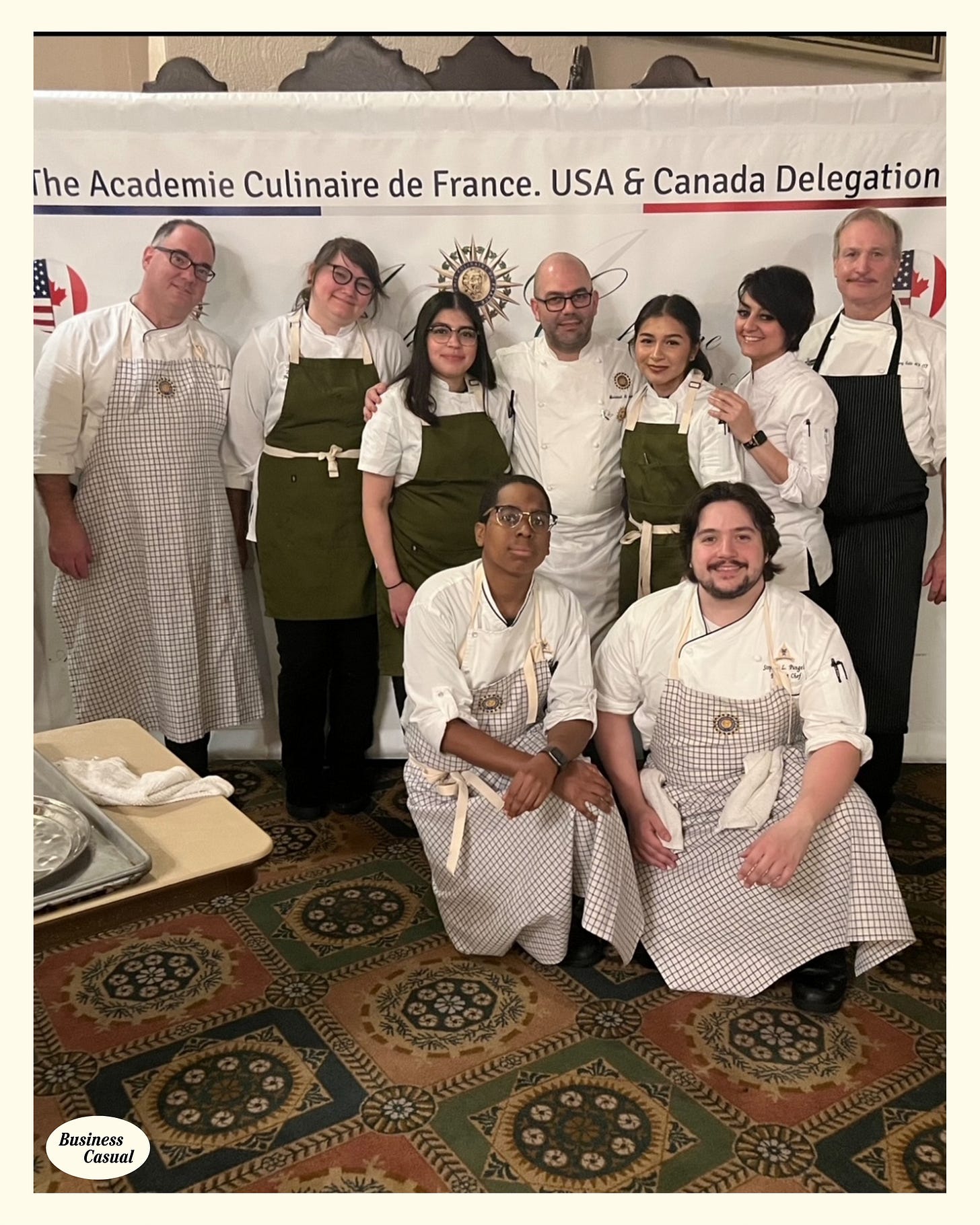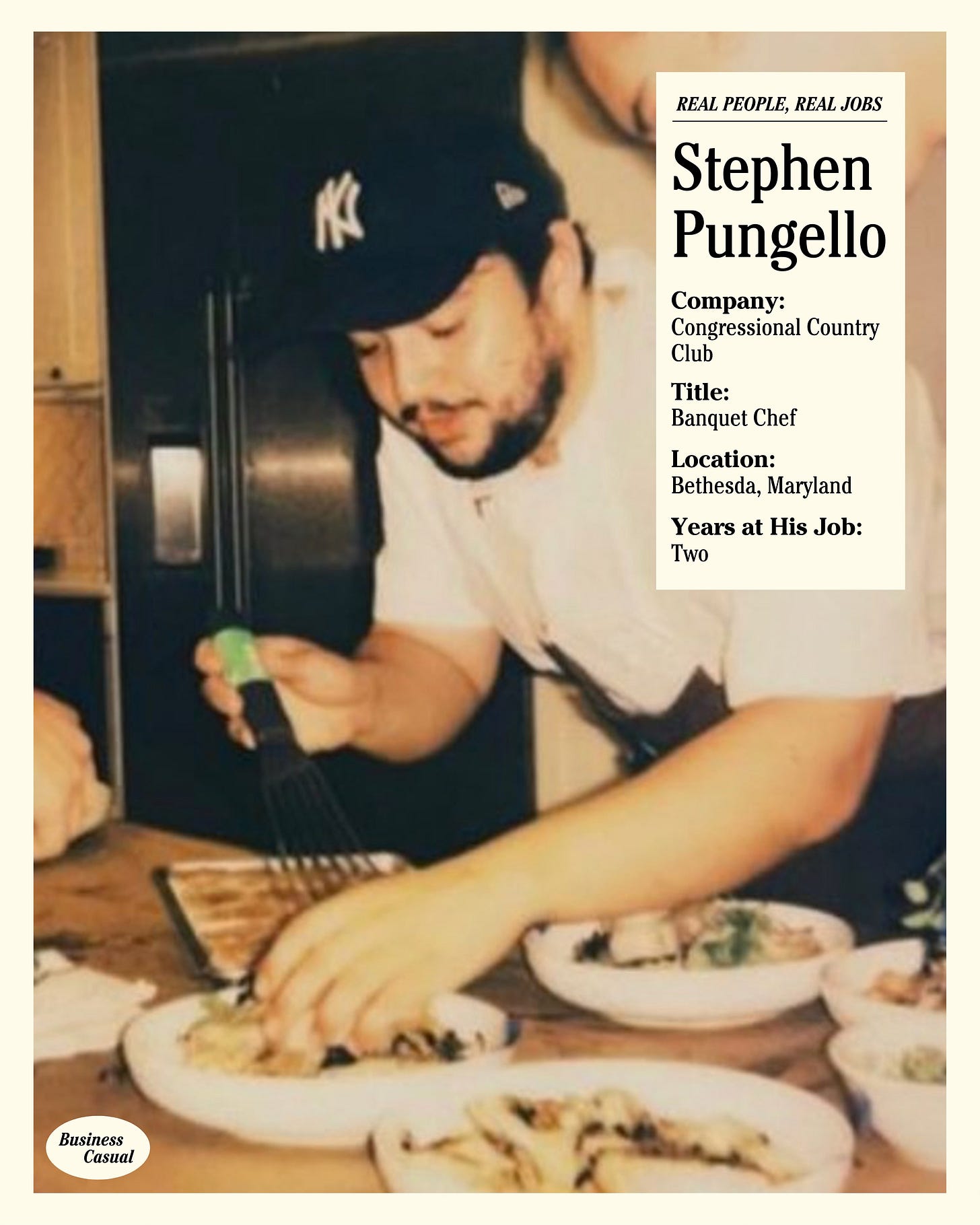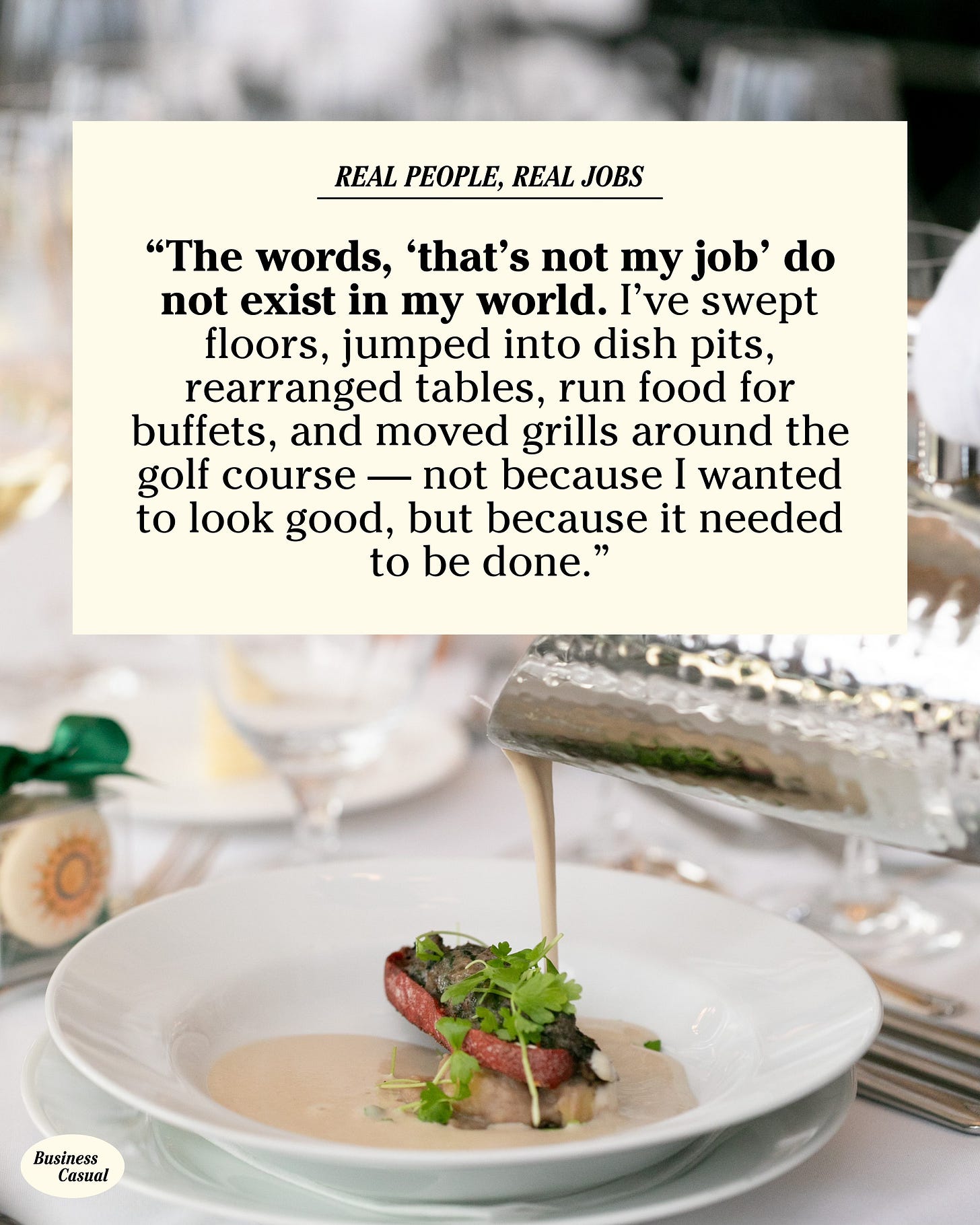“BAM!”
Emeril Lagasse called, and my sister and I answered.
Enraptured, we watched as the celebrity chef peeled potatoes, diced onions, and whipped cream. After Emeril came Sandra Lee, and after Sandra came Paula Deen, her Southern drawl charming and unfamiliar to our California ears.
In the pre-Instagram era, these Food Network stars were the original culinary content creators, and I credit them with instilling a love of cooking in me at a young age — something that’s grown over the years into a broader interest in the food and hospitality industries. So, initially driven by my own curiosity, I wanted to speak with a chef for Real People, Real Jobs. My interest was piqued further when I read that Gen Z men are increasingly turning to the kitchen instead of college, part of a larger Gen Z trend towards the trade professions.
What’s it like to be a real chef, cooking not to entertain a TV audience but to feed hundreds — sometimes thousands — of hungry people every day? Stephen Pungello has the answers.
Stephen Pungello is the Banquet Chef at Congressional Country Club, the number one Platinum Country Club in America. Founded in 1924, the club is one of the most historically renowned in the country, and notable members have included John Glenn, Harvey Firestone, and several U.S. presidents. Stephen began as a saucier for the kitchen, but quickly rose the ranks to lead all culinary banquet operations. A graduate of Culinary Institute of America, Stephen previously worked as a line cook at The Dabney, a Michelin-starred restaurant in Washington, DC. Along with being a chef, he is an avid forager. Here’s the inside scoop on what it’s like to run a large scale food operation.
You don’t need fancy knives, expensive machines, or colorful aprons. You need grit, resolve, and mental toughness. Don’t look for excuses when times get tough, look for solutions and push yourself; if it was easy, everybody would do it.
On a workday in his life: Sunday, March 16, 2025
The club is hosting the esteemed Académie Culinaire de France (ACF) for their annual awards ceremony. This is when worlds collide and it’s a great opportunity to work with chefs from all around the country and put out some awesome food.
8:00am: I begin my day by getting in at 8am, mainly to check on the AM crew and make sure that soup and sauce production is going well. No matter if we are in the busy or less-busy season, we always have an employee cafeteria that feeds 300-400 team members. I make sure the cooks are all set and get to my office, which is the most peaceful time of my day, before most everybody arrives. This is when I check emails and look for any things popping up that concern me, i.e. missed orders or changes to our upcoming events.
10:00am: The first of the guest chefs arrive to begin preparing their various courses. We at the club are handling all the passed hors d’oeuvres so I get out of the office and to my station, and begin working on final touches.
11:00am: I have a brief chat with our Food and Beverage Director about timing, presentations, and any last minute details I need to handle for him.
12:00pm: This is when things get really interesting. As more and more chefs arrive I begin to get pulled from one corner to another of the kitchen responding to requests such as, Stephen, where is a rubber spatula I can borrow?, Stephen, do you have a round mold I can use?, Stephen, do you have extra foie gras?, Stephen the blender shorted the socket, can you reset it?, Stephen, I need help plating my course, who can you give me to assist?, Stephen, where are the pot lids?, Stephen, where are the plates I ordered? And on and on and on it goes.
At this point I am running around the kitchen, making sure that each and every request is tended to. As I go to finish one request, I pick up two along the way. Beads of sweat begin to form on my forehead and my legs burn from running up and down the stairs.
2:00pm: Two hours until guests arrive. Now is when I begin to talk with the team about getting tasting portions of each of the hors d’oeuvres so we can fine tune anything last minute. All is well as I spent the past two weeks R&D’ing everything, so we wouldn't have to do it on the fly, but I always check to make sure my team knows the pickups and can ask any questions.
3:00pm: We begin to see more and more chefs arrive; I have never seen so many in this kitchen before. I am surrounded by the French language and accent — it's a pretty immersive and cool experience. Since my own team is well situated, I run around to ensure that the guest chefs are all square and continue to assist.

3:45pm: We are in full swing now and making sure that the first waves of hors d’oeuvres are ready to go. 200 people can eat a lot of food, and everybody in this room came hungry.
5:00pm: Like a whirlwind the hors d’oeuvres reception is finished, but our night has only just begun. I mobilize my team into our staging area and we begin to plate the soup course. As we are plating, we have an impromptu vegan (GREAT), so I run into the back and make a simple but tasty white and green asparagus tip soup, utilizing some vegetable consomme I had in my cooler.
5:45pm: In between scrambling there is even more scrambling, as we move onto the second course which is fish with cold, warm, and hot elements. I’m entrusted with making sure that the scallops are all seared to perfection and that the vegan course is taken care of. The pastry team helps our guest chef plate his intricate plate and we send the course out. Not done yet.
6:45pm: Time for a palate cleanser and to get ready for our dish-out of the main course. We luckily have speeches to break up the courses, but they do make the dinner longer.
7:45pm: We plate the main course for 200 people in an assembly line to ensure that the plates look nice and do not sit longer than 30 seconds. NOT DONE YET.
8:15pm: I help lay out the cheese course and add finishing touches. More to go.
9:00pm: We are ready to serve desserts so I take a moment to breathe and talk with the chefs I’ve been mainly listening to the whole day. We talk and laugh; it is always my favorite part of these events.
9:30pm: We are invited out to a standing ovation in a room full of very highly successful French chefs and it is awesome! But still, we are not done yet.
10:00pm: It's time to CLEAN!!! We have to make sure that everything is clean and tidy for the next day since we are a 24/7, 365 day operation. I make sure that the AM team is set up for success.
11:15pm: I leave tired but filled with a sense of achievement.
11:50pm: I get home and order some Wendy’s on Uber Eats and pass out to Fast and Furious on my couch!

On a misconception people often hold about his job:
Banquets are not just a bunch of can opening or slicing open bags of pre-cooked foods, getting it hot then plopping it on a plate. They’re like planning a battle, and making sure that your team is well-equipped and has good morale. The volume and level of expectation we have are high, and we all work incredibly hard to execute successfully.
On something about his role that you wouldn’t know from the job description:
As a leader of a major food operation, you are not just cooking; you are in charge of the temperature in the room. Being a leader is not just being the boss, it is about being an example and keeping yourself in check. The words, “that’s not my job” do not exist in my world. I’ve swept floors, jumped into dish pits, rearranged tables, run food for buffets, and moved grills around the golf course — not because I wanted to look good, but because it needed to be done. When your team sees you do anything and everything, they will understand that when you ask them to do something it’s not because you don’t want to, but because you need their assistance.
On what someone who wants his job can do right now to get there:
Find your personal philosophy and do not stop trying to improve things until somebody tells you you’ve gone too far. My philosophy is to “measure twice and cut once” — an old carpenter saying that I picked up from my mom. Before I jump headfirst into anything, I think about all possible outcomes and gather as much data as possible.
People can sometimes do things at work that will take the wind right out of your sails. If you change your mindset and focus on achieving what you think is good, you will make it.
On his favorite part of his job:
Visibly seeing my team members happy and enjoying their work. It is the most important thing to me.
On the most challenging part of his job:
I struggle with not holding other people to my standard or passion standards. Cooking, creating, and leading are cornerstones of my life. However, not everybody shares that and it can sometimes feel like they are insulting what's near and dear to me. In reality, they're just on a different wavelength.
On a more practical level, if you are a social person and like holidays off or time with friends and family, you will not make it very far in this industry. Luckily, I am young and in good health so the physical demands aren’t too bad, but Epsom salt, stretching, and fruits and vegetables are my best friends. Everyday is a workout so you have to prepare your body and mind.
On the most special thing he’s ever cooked:
I was five years old, and I made this creation of Honey Nut Cheerios, peanut butter, caramel, and chocolate. It was the first time I could remember wanting to cook something, and my family all loved it. Not in the way people normally treat a five year old — they seriously loved it, and I loved the feeling of making my family so happy. It was the spark that lit my culinary fire.
On the most memorable guest he’s ever served:
I had the opportunity while working at The Dabney to cook for Tony Hawk. I was on prep so I was not a part of the physical service, but when we all heard he was coming, we were like kids. I grew up playing his video games so this was like meeting a legend. Just to know that the food he ate passed through my sphere of influence was so awesome.
One thing (tool, skill, secret, etc.) anyone who wants his job must know:
You don’t need fancy knives, expensive machines, or colorful aprons. You need grit, resolve, and mental toughness. Don’t look for excuses when times get tough, look for solutions and push yourself; if it was easy, everybody would do it.
One person or publication you must follow if you want his job:
Alexander the Guest — a very inspirational and informative YouTube channel.
His work-life balance on a scale of 1 to 10 (1 = works all the time, including weekends, and doesn’t have any personal free time; 10 = standard 9-5 job with manageable demands):
1.
Thank you for reading! Check out past issues of Real People, Real Jobs here.







